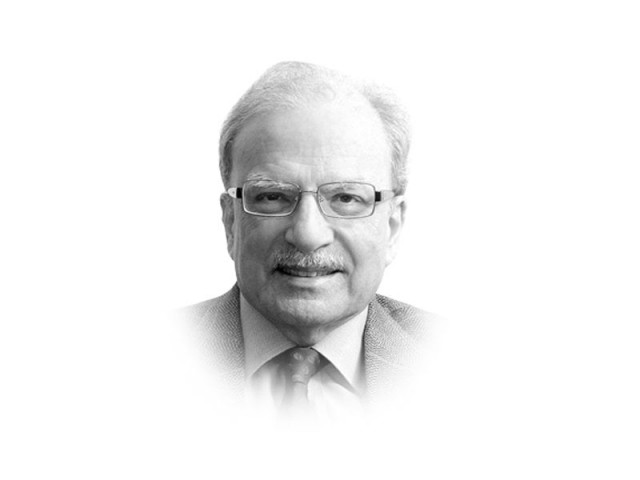G-20 in Buenos Aires
In most of their meetings, the heads of state have discussed economic issues

The writer is a former caretaker finance minister and served as vice-president of the World Bank
In most of their meetings, the heads of state have discussed economic issues. This time around, however, politics dominated the deliberations. The health of the global economy was reasonable. The United States was growing at a healthy rate of 3.5 per cent, higher than of all rich nations. The rate of unemployment had touched historical lows and inflation was low. The only problem the country faced was the poor understanding of economic issues by its leader, President Donald Trump. As the Nobel Laureate Paul Krugman put in a column written for The New York Times, “talking about what Donald Trump does not know is, of course, a vast task, since his ignorance is both broad and deep.”
The American president continued to focus his attention on the loss of jobs in the country’s industrial sector, believing that they have been stolen by countries such as China. He did not understand that the move of jobs from the manufacturing to the service sector was a part of the process of sustained development in rich nations. Jobs have declined in the manufacturing sector; in 1970, the sector employed more than a quarter of the workforce but now it accounts for only 10 per cent. The various components of the service sector employ a significantly larger proportion of the workforce. Of the four occupations that would add more jobs in the United States, three are some kind of nursing; food workers are the fourth. Applying tariffs to the imports of manufactures from China would not reverse the process.
Although the trade spat involving the United States and China was on the minds of the leaders attending the meeting, nothing of substance was achieved. A number of political issues came up for discussions mostly in the bilateral conversations among the leaders. These were the US-Russia relations; the ‘role played by Muhammad bin Salman’, or MBS, in the assassination of Jamal Khashoggi, a Saudi Arabian journalist of great repute; and the aggressive reach out to its neighbourhood by China under the leadership of President Xi Jinping.
The news that President Donald Trump cancelled his planned meeting with Vladimir Putin, his Russian counterpart, dominated the news as the leaders assembled in the Argentinian capital. Washington and Moscow had included a two-hour meeting between the two leaders. That Trump was walking out of this arrangement was obviously a late decision, taken as the American president was already in his plane on the way to Buenos Aires. The announcement came in the form of a tweet issued by Trump from the plane. The language used in the tweet was obviously not of the president but carefully drafted by the members of the national security team who were on the plane with the president.
What prompted Trump to cancel the meeting was probably the revelations made by his longtime associate Michael Cohen of the various deals Trump and his family members were working on while he was campaigning for the US presidency. Trump had denied any such involvement during the elections and after moving into the White House. The international community was more concerned with Russia’s expansionist designs in its neighbourhood. The latest move in this direction was the capture of Ukrainian boats and sailors by the Russian Navy in international borders.
The United States intelligence services had concluded that MBS had given the orders to kill Khashoggi, a finding that Trump was not prepared to accept. Relations with Saudi Arabia had a long history and were considered to be vital for the United States’ economic and strategic interests. There was also the impression that the Trump family had economic interests in the Kingdom. No one-on-one meeting was scheduled with MBS. The G20 meeting was treated by MBS as a “coming out” event following the Khashoggi affair. According to accounts, Manuel Macron, the French President, gave a strong message to MBS, asking for an international investigation of the journalist’s killing.
Trump had a dinner meeting with Xi Jinping and came out speaking well of the relationship with the Chinese leader. He had entertained him earlier at Mar a Largo, his resort in Florida, after which he began to refer to the Chinese leader as “my friend”. The fear that the two leaders would not be able to resolve their issues kept the markets across the globe on edge. But the dinner led to the decision that the two countries would postpone any further action for three months during which officials from the two sides would attempt to find a way out. What concerned the United States most was that the Chinese, in allowing foreign companies to enter their space, was generally in the form of joint ventures with their own companies. This was one way of getting access to American technologies. It was also alleged that the Chinese were resorting to hacking American firms to gain access to technological knowhow.
Most experts believed that the two countries would not be able to resolve their differences in the 90 days they had given themselves. Trump, after being euphoric about the Buenos Aires outcome, began to talk once again about using high tariffs to force China to move in the direction in which he wished Beijing to go. There were sharp market declines in the first week of December. Buenos Aires meeting did not ease market fears.
Published in The Express Tribune, December 10th, 2018.
Like Opinion & Editorial on Facebook, follow @ETOpEd on Twitter to receive all updates on all our daily pieces.















COMMENTS
Comments are moderated and generally will be posted if they are on-topic and not abusive.
For more information, please see our Comments FAQ